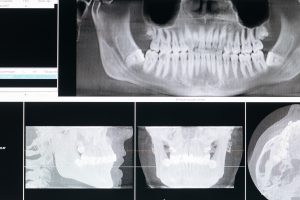You probably understand that there are many things you should do to keep your teeth healthy and strong. For instance, you may know that you should floss and brush regularly. You’ll also need to schedule regular dental cleaning appointments. Many people, at any age, decide to have their wisdom teeth removed due to painful tooth eruptions or to protect the integrity of their smiles.
Wisdom teeth usually emerge sometime between the ages of 17 and 25 but ideally should be evaluated, likely in a radiograph, in the neighborhood of 14-15 years old. Whether or not the ideal time to remove them is then or later can then be determined. Few people have wisdom teeth that emerge without any problems and line up with the other teeth behind the second molars. Most individuals have limited arch length of the jaw and therefore aren’t able to accommodate the effective eruption and function of the third molars or wisdom teeth. An impacted wisdom tooth may partially emerge so that some of the crown is visible (partially impacted), or it may never break through the gums (fully impacted). Whether partially or fully impacted, the tooth may:
- Grow at an angle toward the next tooth (second molar)
- Grow at an angle toward the back of the mouth
- Grow at a right angle to the other teeth, as if the wisdom tooth is “lying down” within the jawbone
- Grow straight up or down like other teeth but stay trapped within the jawbone
There is a good chance that you or your teen’s wisdom teeth don’t erupt correctly. Unfortunately, this means your wisdom teeth could push against other teeth while they erupt. This can make other teeth shift, which might potentially undo any orthodontic work previously done. This can also lead to crooked teeth. Similarly, after wisdom teeth erupt, your smile could be overcrowded.
If you don’t get your wisdom teeth removed, you’ll have a hard time removing bacteria from your smile. This can lead to tooth decay because your wisdom teeth are so far back. Still, this means it can be difficult for you to clean your back teeth. If your smile is overcrowded, they might be much harder to clean. In addition, wisdom teeth can cause resorption or loss of tooth structure of teeth adjacent to the wisdom teeth. On numerous occasions, patients have lost both the second and third molars due to non-restorable resorption of teeth adjacent to the third molars.
So, wisdom teeth can potentially become impacted, or stuck in or beneath your gums. If wisdom teeth are impacted, you could be more susceptible to an infection and they can only be a liability. You can trust you are in good hands with Dr. Spear. He has removed thousands of wisdom teeth from all ages and different stages of eruption. Dr. Spear’s technique is fast and conservative while his level of after-care is unmatched.
If you would like to learn more about the procedure and cost of removing a wisdom tooth in Fort Worth, Texas, please feel free to give our office a call at 817.920.1488. Our dentist, Dr. Spear, and our team will be happy to examine your teeth and gums and to give you personalized advice and create a treatment plan that is best for you.


